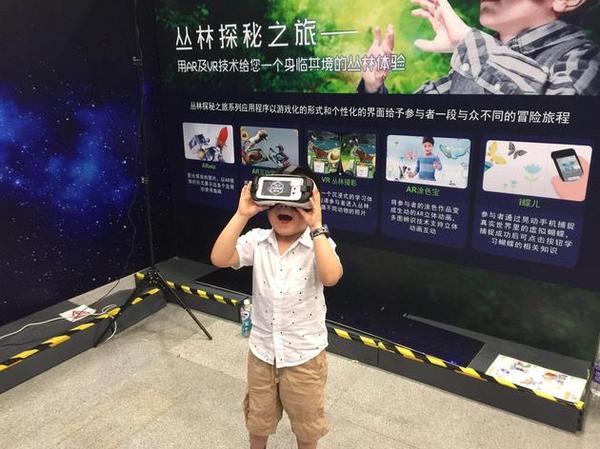
Bloomberg today wrote that with the development of virtual reality technology, some companies have begun to deploy this technology in the field of education, hoping to enhance the learning effect of students through comprehensive analysis, and promote commercialization through the data collected in the process. project.
The following is the full text of the article:
In an office building that resembles an interstellar spaceship, a little-known Chinese company is exploring the future of education. They use a large number of servers to record various data about children's learning and play, including sliding touch screens, shrugging, turning their heads, etc. - the vast amount of data that is aggregated will be used to create personal data for millions of children.
The company is called Fuzhou Netlong Network Holdings Co., Ltd. They used to develop various video games for killing and killing, so it seems difficult to imagine that such a company will change the direction of virtual reality education. From IBM to Lenovo, more and more companies are now studying how to use the technology of virtual reality to attract children's attention, and one day they may even show ads to them. Net Dragon is one of them.
Chinese parents have always adhered to the concept of “cannot let children lose on the starting lineâ€, and the focus on privacy is often low. Because of this, it has become an ideal testing ground for virtual reality classrooms. According to the assumptions of relevant companies, there will be no children sleeping in the seats in the future. Once the software predicts through the head movement that the student may be distracted, the course will be changed. Through some easy-to-understand quizzes, the original boring course will immediately become full of fun. Even the teacher's gender can be adjusted to suit the needs of the students. For example, if a teacher in a certain place is mainly male, the virtual reality teacher can be adjusted to a male.
“This is an important trend in the future, and it has been brewing for a while,†said Jan-Martin Lowendahl, vice president of research at Gartner, a US market research firm. “If he can play a role,†That must be a country like China and South Korea."
“This is a revolutionary business and it is also necessary because the current education model is clearly unable to achieve scale expansion.â€
The so-called computerized adaptive teaching has appeared more than ten years ago. As long as the method is right, it is possible to completely change the way of learning. The digital image designed by the algorithm can replace the traditional teacher or promote it. This model can also be copied around the world. Proponents believe that the use of computers to analyze children's behavioral habits in order to adapt to their various shortcomings can bring great benefits. Despite some privacy issues, this technology still outweighs the disadvantages because human teachers will soon be in short supply.
"If you don't increase the rapidly expanding learning technology, you can't solve this problem," Rovindahl said.
Of course, the companies involved are not unselfish – there are huge economic benefits, and in a sense, Chinese companies will take the lead in the commercialization process in this field. NetDragon hopes to be one of the first companies to apply this technology on a large scale. Last year, the company spent £77 million ($100 million) on the acquisition of British online education provider Promethean World Plc, which currently serves 40 million students and 2.2 million teachers. The company is also testing virtual reality courses in the field, giving virtual reality masks and tablets to schools in China to encourage teachers to try custom courses.

Researchers can then track student activities in a virtual reality environment, and as a supplement, a tablet with a camera can be used to visually monitor students.
“We not only hope to track children in the classroom, but also hope to track them when they walk around, use mobile phones or stay at home, so as to understand the way children learn.†Vice Chairman of Net Dragon and Microsoft Qiangao Two years ago, he added, the technology may be ready by 2017. “Once you can understand their preferences, you can recommend different services and show very accurate advertising.â€
All companies surveyed stressed that relevant data will only be collected if explicit legal protection is obtained. But it is still unclear how parents will react to this. Not only that, but they must also make all schools aware that such a technology can eventually complement them.
Stevenson Won, an associate professor at Cornell University, specializes in human responses in a virtual reality environment. He said the technology will further bring scenes from science fiction to real life, using one person in numbers. Behaviors in the environment assess their ability to learn and create, even suffering from Alzheimer's disease.
"As an ordinary citizen, I really don't like to let others track my behavior, predict the diseases I may have, and even send me advertisements directly," she said.
It is necessary to collect data from millions of people and use computers to analyze them, find specific features, and then translate them into practical actions to truly develop useful digital teachers. Affectiva, which was spun off from MIT, and Beyond Verbal Communication, an Israeli startup, want to understand what users think based on facial expressions and sound patterns. In addition to NetDragon, Lenovo's Stoneware also installed tracking devices in the classroom.
Although Western technology companies are developing similar technologies, their children are very cautious when applying these technologies. Chinese companies seem to be less worried about this issue, which is why they are at the forefront of commercialization. Henry Lau, an associate professor at the University of Hong Kong, helped run a virtual reality lab called imseCAVE, putting adult volunteers in an interactive simulation box and then studying how they used to drive virtual cranes or use sticks to suppress criminals. State changes.
"The initial focus of the Americans is clearly on the technology. Many Chinese companies want to use a cost-effective platform to develop content." Henry Liu said, "We have cooperated with companies in Beijing, they are developing what we call electronics. learning software."
Chalapathy Neti is the vice president of education innovation at the IBM Watson team, who are building materials for students around the world. He said that Asian parents are more willing to involve children in such projects than Western parents. The researchers also said that after the integration of virtual reality and interactive technology, the learning effect can be greatly improved.
"In the course of virtual reality teaching, if the student pauses, stares at the stars in the sky, and keeps staring at a certain star, I know that he is particularly interested in this field." He said, "When my child comes At the zoo, they don't look at animals at all, but instead focus on the engines of the trains we ride – they are now in the automotive industry.
60Pcs Make-Up Remover Wipe,60Pcs Makeup Wipes,60Pcs Oil Free Makeup Wipes,Makeup Remover Wipes
DONGYANG COMEXA SANITARY PRODUCTDS LTD.,CO , https://www.comexawetwipes.com